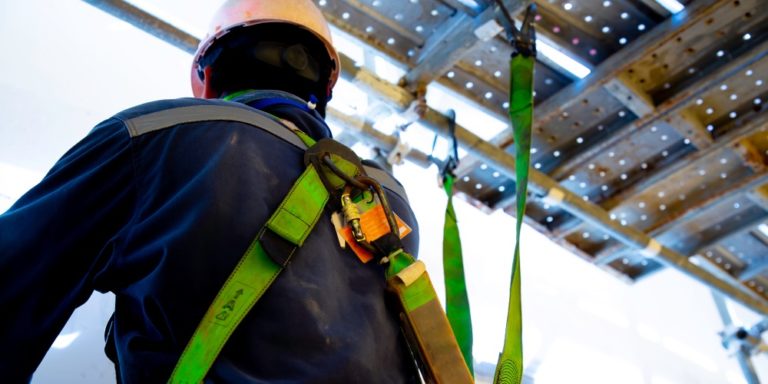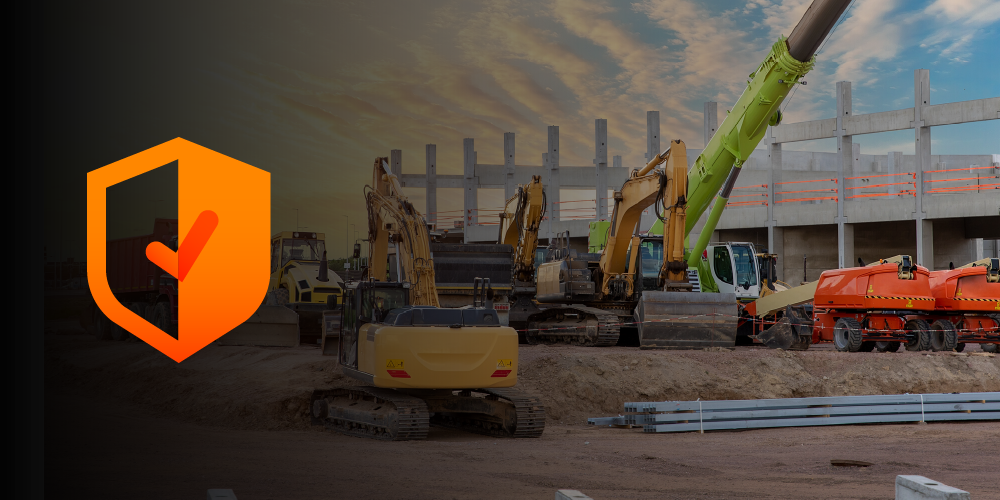— 7 min read
A Contractor’s Guide to Builder’s Risk Insurance
Last Updated Aug 14, 2024
Last Updated Aug 14, 2024

Any party with a vested interest in new construction or a remodel project should consider carrying builder’s risk insurance. Those stakeholders might include an entity that has direct or indirect involvement in ushering the structure from the building stages to completion.
Like other insurance policies, builder's risk is designed to protect the financial interests of entities that have money and resources committed to the project. A builder’s risk policy has a lot of moving parts, so a prospective policyholder or additionally insured party will need to get beyond the basics to better understand the risks and coverages involved.
Table of contents
What is builder’s risk insurance?
Builder's risk insurance — also called “course of construction insurance” — provides coverage for buildings that are currently under construction. Most builder's risk insurance agreements also have core coverages that extend to both installed building materials and those stored on or off the project site.
Depending on the terms of the project’s contract, a policy may need to be carried by either the owner or general contractor. It’s important to note that most builder’s risk policies do not include liability coverage, so contractors should look to general liability policies for said protection.
Learn more: Builder’s Risk vs. General Liability
What does builder’s risk insurance cover?
With revenue and profitability on the line, it’s critical to have an adequate understanding of the perils included in the policy. It's important to read the physical policy to make sure you understand what the policy covers — and what it doesn't.
Policies will vary among carriers, but at a minimum, you can expect property coverage for the following exposures:
- Theft
- Vandalism
- Fire damage
- Water damage
- Damage from weather such as wind, lightning, and hail
- Explosions
- Structural collapse
If a builder's risk claim is incurred, the insurance will also cover the cost to remove debris or contaminants from the construction site.
Materials, supplies, and equipment are also protected from these perils through builder’s risk insurance, whether stored onsite, offsite, or in transit. Coverage also extends to materials or fixtures installed in the partially constructed building.
Additionally, an installation floater can be added to a builder's risk policy to protect the value of building materials that will become a permanent part of a commercial or residential structure. The coverage typically begins when you take possession of, and transport, roofing shingles, windows, flooring, etc., and ends when those materials are installed as intended.
A builder’s risk policy will usually include coverages that protect contractors and related parties outside the physical realm. For instance, a general contractor may be indemnified for “soft costs” realized if construction delays trigger fees or penalties from a lender or government body.
Most insurance companies will allow policies to be customized so that an insured’s needs correspond to the various types of builder’s risk coverages.
What it doesn't cover
Policy exclusions list what isn’t covered by builder’s risk insurance. Primarily, liability is one large piece of the puzzle that contractors will most likely need to secure through a separate policy.
To avert financial damages, you’ll need to be aware of what other coverages do not extend from builder’s risk contracts:
- Wear and tear: During the course of construction, damage caused by ordinary wear and tear on a structure will not be covered.
- Employee theft: If employees (not outside parties) walk off with equipment or materials, builder’s risk insurance won’t cover the loss — but other forms of business insurance will.
- Manufacturing design and defect: Coverage for flaws in completed products used in construction will need to come from another commercial insurance policy.
- Mechanical breakdown: Builder's risk will not cover the cost of repair to equipment that fails to operate during construction.
Who needs builder’s risk insurance?
While a builder’s risk policy may be purchased by either an owner or general contractor, coverage can extend to several other stakeholders by having specialty contractors or project designers named as additional insureds on the agreement. In fact, any party with a financial interest in development and construction should ensure that their company is listed on the policy through an additional insured endorsement.
Some of the more common parties insured under a builder's risk policy include:
- General Contractors
- Specialty Contractors
- Developers
- Engineers
- Architects
- Owners
- Investors
- Lenders
How much does builder’s risk insurance cost?
The cost of a builder’s risk policy hinges on the size and scope of a construction project. The insurance premium for a $250,000 residential dwelling will be considerably less than the cost of insuring a $2.5 million commercial building.
Individual circumstances and scope of work vary greatly from project to project and contractor to contractor. Discussing coverage needs with an insurance professional will help determine what dollar amount adequately protects the interests of all stakeholders.
Other factors that could affect the price of a builder’s risk policy, include:
- The location of the project
- The length of time the policy will be active
- The quality of the materials used on the job.
Optional coverage endorsements should be strongly considered and may also add to the cost of builder's risk.
To protect the project from catastrophes such as wildfires or earthquakes, for example, contractors may want to ensure risks like these are included or purchased as separate endorsements. That add-on may create a separate coverage amount (or sub-limit) that differs from the overall limits.
Things like hot testing, debris removal, offsite storage, soft costs, etc. may have sub-limits that differ from policy limits— or may not be included at all. It’s critical to review the policy to ensure it completely addresses the project's specific needs.
Who pays for builder’s risk insurance — the owner or contractor?
The terms of the contract will likely determine who pays for builder’s risk insurance — but, the cost may be incurred by either the contractor or the owner. Regardless of who pays, specialty contractors, architects, etc. should be added to the policy via the additional insured endorsement.
There may be circumstances under which a policy can be obtained less expensively by a contractor. In these instances, the owner is simply added as an additional insured. Many contractors choose to purchase a policy for each new construction or remodel job to make certain that their financial interests are sufficiently protected.
How to choose a builder’s risk insurance policy
While builder’s risk insurance is not hard to obtain, it requires considerable effort to find people who can help stakeholders assess appropriate coverage, choose adequate limits, and select the right policy.
Contractors must look for partners with extensive insurance industry knowledge as well as a deep understanding of the construction industry. More specifically, the insurer needs to consider the uniqueness of each project and the distinct risks involved as before, during, and after the job.
Here are four things contractors must keep in mind when selecting a builder’s risk policy:
- Find an insurance carrier that has a strong track record of issuing builder’s risk policies.
- Find a carrier that has top ratings for financial strength as it applies to claims-paying ability.
- Find an agent, broker or consultant who has a deep understanding of business insurance for contractors— especially in the builder’s risk arena.
- Review the proposal and premium quote carefully to make sure that coverages and endorsements meet your needs and that the proposed cost fits your budget.
Another important component of a successful relationship is engaging people who can assist in identifying risk. It’s critical to retain insurance partners who understand uncertainty and how it could impact a project’s schedule, quality, valuation, and budget.
Protecting from risk is essential to construction
Addressing financial risk has many facets in the construction industry. Primarily, it enables contractors to plan for the unexpected with insurance. It also helps protect business assets and can prevent further delay on projects.
Was this article helpful?
Thank you for your submission.
95%
5%
You voted that this article was . Was this a mistake? If so, change your vote here.
Scroll less, learn more about construction.
Subscribe to The Blueprint, Procore’s construction newsletter, to get content from industry experts delivered straight to your inbox.
By clicking this button, you agree to our Privacy Notice and Terms of Service.
Categories:
Tags:
Written by
Thomas Tracy
13 articles
Thom is a group benefits consultant with over 25 years of experience as an insurance and financial advisor. He has written for Quickbooks, tED Magazine, Investopedia, the National Bank of Arizona, and others.
View profileReviewed by
Melody Bell
Melody Bell is Director of Underwriting at Procore. Previously, she spent 15 years as Director and Vice President for managing general agents in the U.S. and London, with a focus on construction GL, SDI and professional liability. Melody holds a bachelor's degree from the University of Southern California and a JD from USC Gould School of Law. She lives outside of San Bernadino, CA.
View profileExplore more helpful resources

What is Equipment Floater Insurance for Contractors?
Most contractors rely on tools and equipment to complete construction projects. But if something happens to those items, they can be expensive to replace. Contractors can benefit from purchasing an...

Construction Equipment Rental Insurance: How & Where to Get Coverage
Contractors and construction businesses that rent equipment should consider getting construction equipment rental insurance. This type of insurance covers the cost of replacing rented tools and equipment if they get...

Understanding Construction Insurance: Actuarial vs. Underwriting Factors
Determining the price of construction insurance is complex, with much of the work happening behind the scenes. Most construction companies interact primarily with an insurance broker or agent, but actuaries...

Construction Insurance Pricing: What Determines the Cost of Insurance?
Construction is a risky and litigious business, and insurance can help mitigate the risks for builders and owners. Construction insurance is a valuable and frequently required tool, so understanding how...